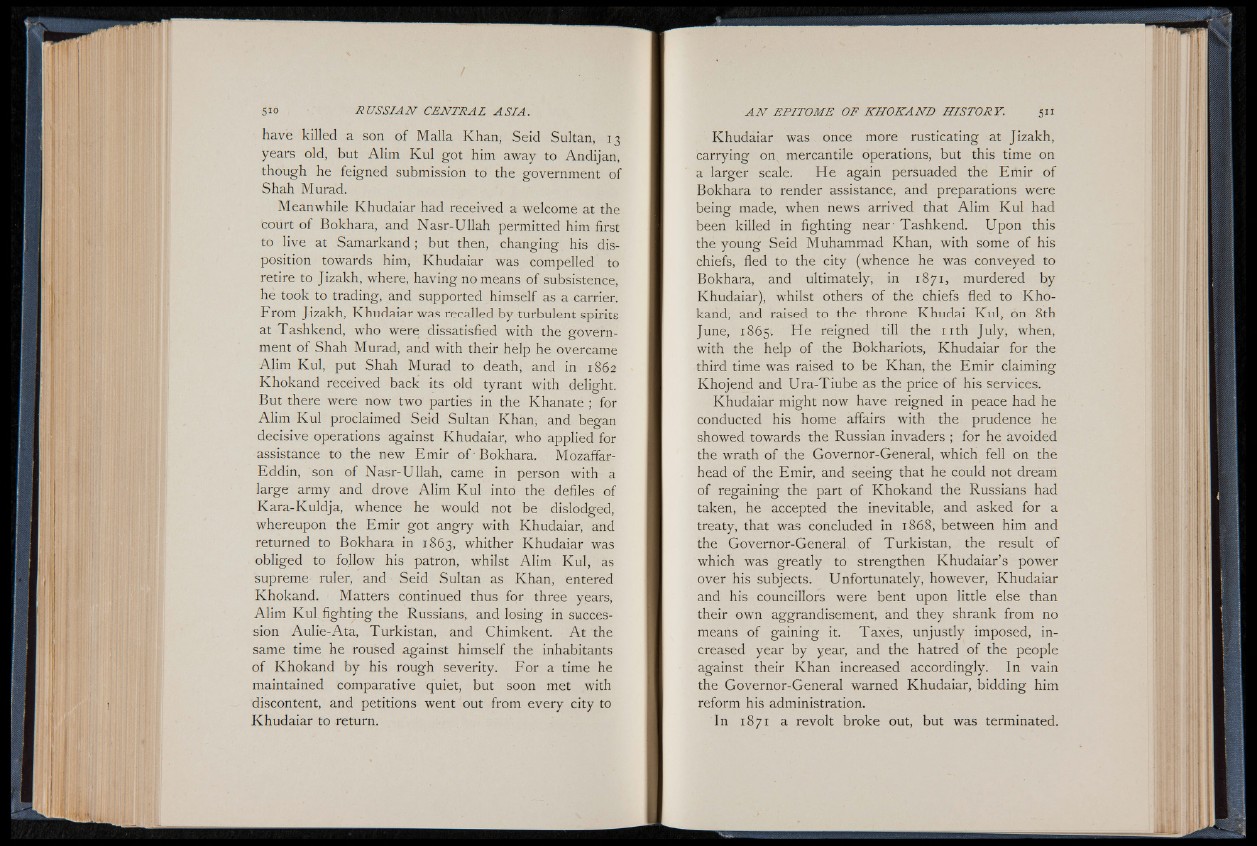
have killed a son of Malla Khan, Seid Sultan, i \
years old, but Alim Kul got him away to Andijan,
though he feigned submission to the government of
Shah Murad.
Meanwhile Khudaiar had received a welcome at the
court of Bokhara, and Nasr-Ullah permitted him first
to live at Samarkand; but then, changing his disposition
towards him, Khudaiar was compelled to
retire to Jizakh, where, having no means of subsistence,
he took to trading, and supported himself as a carrier.
From Jizakh, Khudaiar was recalled by turbulent spirits
at Tashkend, who were dissatisfied with the government
of Shah Murad, and with their help he overcame
Alim Kul, put Shah Murad to death, and in 1862
Khokand received back its old tyrant with delight.
But there were now two parties in the Khanate ; for
Alim Kul proclaimed Seid Sultan Khan, and began
decisive operations against Khudaiar, who applied for
assistance to the new Emir of - Bokhara. Mozaffar-
Eddin, son of Nasr-Ullah, came in person with a
large army and drove Alim Kul into the defiles of
Kara-Kuldja, whence he would not be dislodged,
whereupon the Emir got angry with Khudaiar, and
returned to Bokhara in 1863, whither Khudaiar was
obliged to follow his patron, whilst Alim Kul, as
supreme ruler, and Seid Sultan as Khan, entered
Khokand. Matters continued thus for three years,
Alim Kul fighting the Russians, and losing in succession
Aulie-Ata, Turkistan, and Chimkent. A t the
same time he roused against himself the inhabitants
of Khokand by his rough severity. For a time he
maintained comparative quiet, but soon met with
discontent, and petitions went out from every city to
Khudaiar to return.
Khudaiar was once more rusticating at Jizakh,
carrying on mercantile operations, but this time on
a larger scale. He again persuaded the Emir of
Bokhara to render assistance, and preparations were
being made, when news arrived that Alim Kul had
been killed in fighting near- Tashkend. Upon this
the young Seid Muhammad Khan, with some of his
chiefs, fled to the city (whence he was conveyed to
Bokhara, and ultimately, in 1871, murdered by
Khudaiar), whilst others of the chiefs fled to Khokand,
and raised to the throne Khudai Kul, on 8th
June, 1865. He reigned till the n th July, when,
with the help of the Bokhariots, Khudaiar for the
third time was raised to be Khan, the Emir claiming
Khojend and Ura-Tiube as the price of his services.
Khudaiar might now have reigned in peace had he
conducted his home affairs with the prudence he
showed towards the Russian invaders ; for he avoided
the wrath of the Governor-General, which fell on the
head of the Emir, and seeing that he could not dream
of regaining the part of Khokand the Russians had
taken, he accepted the inevitable, and asked for a
treaty, that was concluded in 1868, between him and
the Governor-General of Turkistan, the result of
which was greatly to strengthen Khudaiar’s power
over his subjects. Unfortunately, however, Khudaiar
and his councillors were bent upon little else than
their own aggrandisement, and they shrank from no
means of gaining it. Taxes, unjustly imposed, increased
year by year, and the hatred of the people
against their Khan increased accordingly. In vain
the Governor-General warned Khudaiar, bidding him
reform his administration.
In 1871 a revolt broke out, but was terminated.